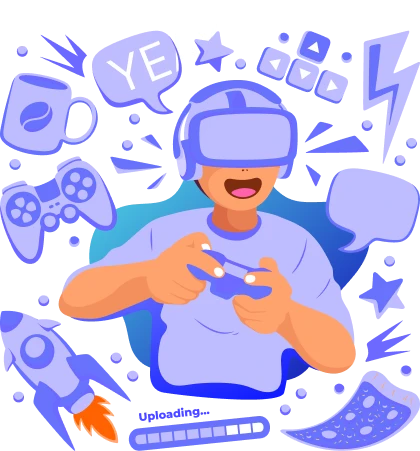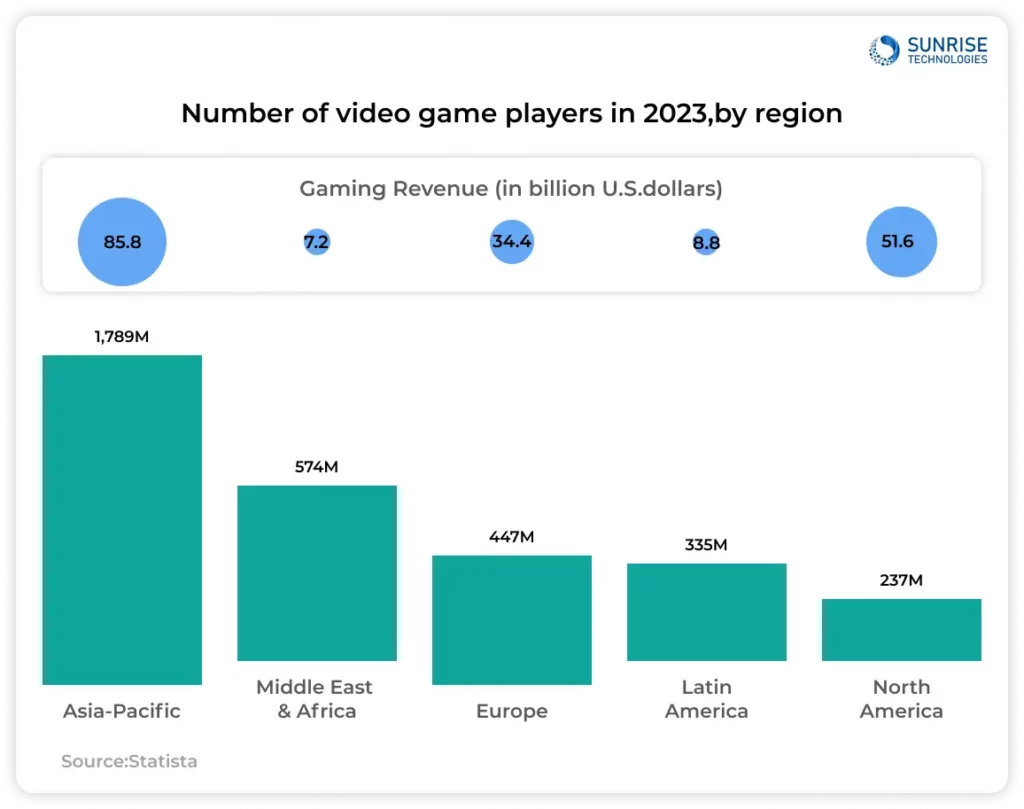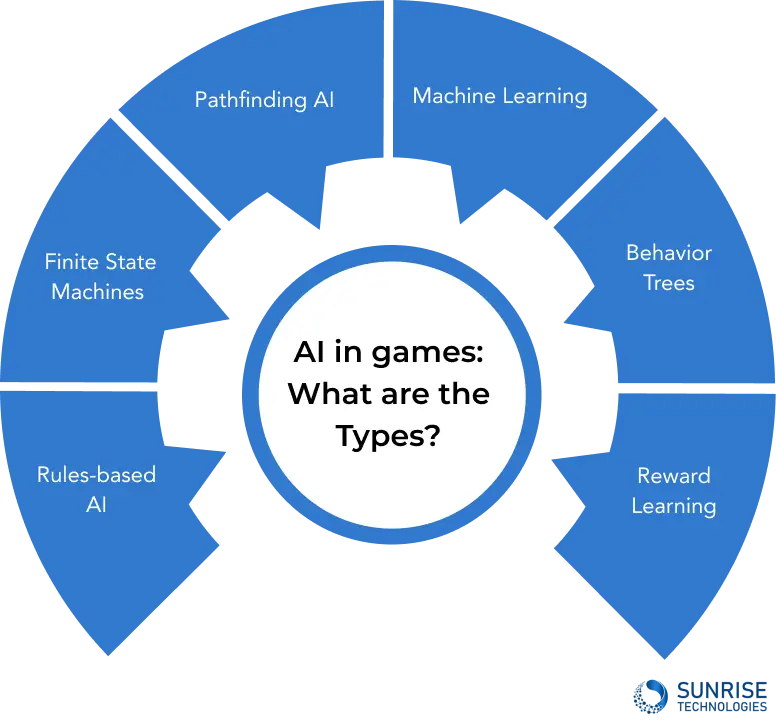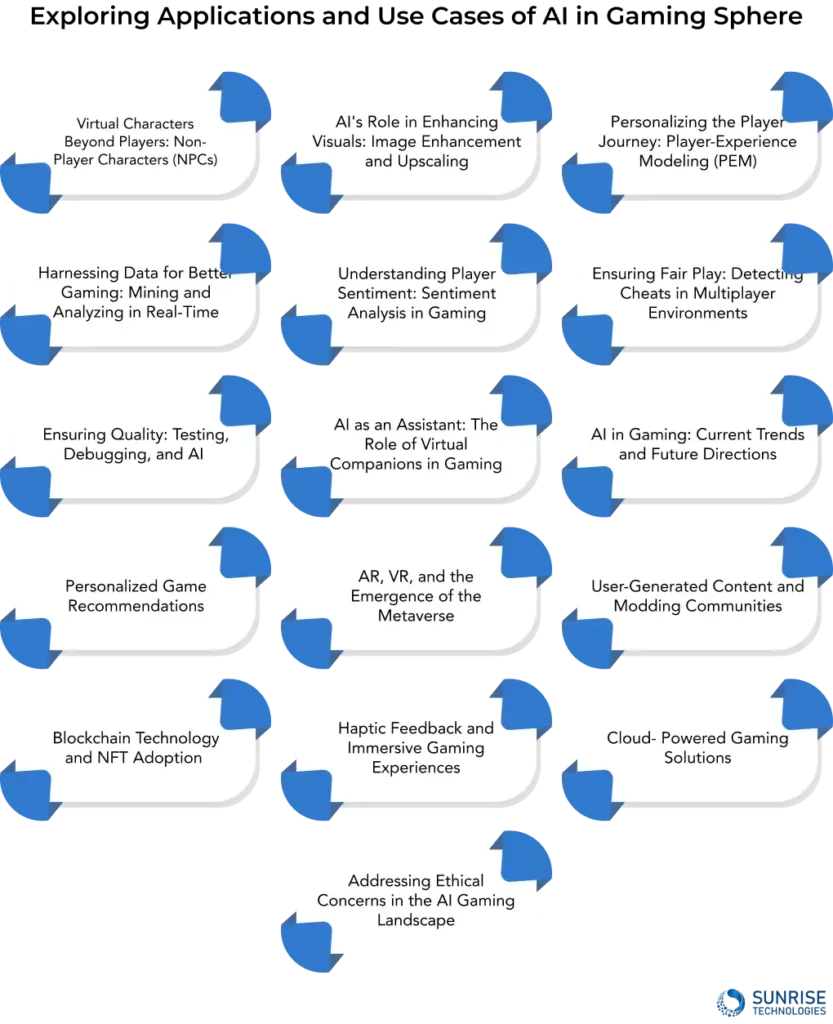
Unveiling the Role of Artificial Intelligence in Shaping modern gaming experiences
April 12, 2024
The gaming world has seen big changes in recent times, just as exciting as the games themselves. These changes are because more and more people want thrilling adventures, the legalization of online betting, fantasy sports apps are a hit, game developers are in tough competition and new technologies like AI are being used in game development. AI is helping make better games and giving players more personalized experiences, pushing the gaming world into a new era of innovation and endless possibilities.
During the pandemic, when people were confined to their homes, they turned to online gaming for entertainment. Now that the pandemic has passed, online gaming continues to be one of the most popular forms of entertainment, with more than two and a half billion active players around the world. In the future, AI will continue to revolutionize online gaming, particularly with NPCs.
In addition to enhancing gameplay experiences, AI is revolutionizing various aspects of the gaming industry, including character development, procedural content generation, player behavior analysis, and adaptive difficulty adjustment. With AI algorithms becoming more sophisticated, games can offer richer narratives, dynamically generated environments, and challenges tailored to individual player skill levels. This not only keeps players engaged but also opens new creative possibilities for developers, leading to a more immersive and enjoyable gaming experience for all.
Witnessing the remarkable surge and widespread appeal of online gaming, game developers are actively crafting a diverse selection of casual games, mid-core games, and AAA games to captivate the vast audience, with AI playing a pivotal role. With ongoing advancements in AI within the gaming sector, we can anticipate the emergence of increasingly inventive AI-powered gaming solutions in the days ahead.

Real World Example: FIFA 2022 – EA Sports
FIFA 22, developed by EA Sports, utilizes various AI techniques to enhance the gaming experience and create realistic gameplay. Here are some ways AI is implemented in FIFA 22
- Gameplay AI: FIFA 22 features sophisticated gameplay AI that controls both teammates and opponents. The AI determines player positioning, movement, decision-making, and tactics during matches. This includes AI-controlled players making runs, tracking opponents, intercepting passes, and executing plays based on the game situation.
- Dynamic Tactics: FIFA 22 introduces new dynamic tactics that allow players to customize their team's playing style and strategies. The AI adapts to these tactics, adjusting its gameplay approach to counter or exploit the player's chosen tactics. This adds depth and realism to the tactical aspect of the game.
- Player Behavior: The AI in FIFA 22 governs player behavior, including reactions to in-game events, emotional responses, and decision-making during matches. This includes AI-controlled players responding realistically to goals, fouls, referee decisions, and other game situations.
- Skill Moves and Animation: FIFA 22 incorporates AI-driven animation systems to control player movements and skill moves. The game uses motion capture technology and AI algorithms to generate fluid and realistic animations for dribbling, shooting, passing, tackling, and other actions performed by players.
- Adaptive Difficulty: FIFA 22 includes adaptive difficulty settings that adjust the AI's skill level based on the player's performance. If the player is struggling, the AI may become less aggressive or make more mistakes to provide a more manageable challenge. Conversely, if the player is performing well, the AI may increase its difficulty to maintain competitiveness.
- Career Mode AI: In FIFA 22's career mode, AI-controlled teams make strategic decisions regarding player transfers, squad management, and tactics. The AI evaluates player performance, team needs, and financial constraints to make realistic decisions in building and managing their teams.
- Ultimate Team AI: In FIFA Ultimate Team mode, the AI controls opponents in single-player matches and determines squad selection, formation, and gameplay tactics. The AI adjusts its difficulty level based on the player's Ultimate Team's skill level and performance.

Overall, FIFA 22’s AI plays a crucial role in delivering a realistic and immersive gaming experience, from controlling player behavior and tactics to providing challenging and dynamic gameplay across various game modes.
AI in games: What are the Types?
Rules-based AI
Rules-based AI works on the basis of a set of pre-determined rules and conditions which control the behavior of NPC characters in the game. Usually, the rules are programmed by the developers and determine how NPCs should behave in different situations. For instance, in a stealth AI game, if a player is detected by a NPC, the rules-based AI will tell the NPC to warn nearby guards.

Finite State Machines
Finite state machines (FSM) model NPC behavior by breaking it down into different states and the transitions between them. Each state is associated with a particular behavior/action. The transitions happen in response to specific triggers/conditions. For example, in a combat game, a NPC might switch from “patrolling” state to “alert” state when it sees the player.
Pathfinding AI
The goal of pathfinding AI is to find the most efficient way for non-player character (NPC) to move through the game world by calculating the shortest viable path using algorithms like A*(A star). This helps NPC navigate through complex environments intelligently and seamlessly.
Machine Learning
Machine Learning AI brings flexibility and learning capabilities to NPC behavior. Training with historical data and experience allows AI models to make informed decisions based on player interactions. For instance, in a racing game, an AI opponent may improve his racing line or cornering technique as time goes on.
Behavior Trees
Behavior Trees provide a flexible way to structure AI behavior. These trees outline NPC behaviors in a hierarchical order, with each node representing an action, condition, and state. This allows NPCs to dynamically change their behavior based on changing circumstances.
Reward Learning
Reward learning involves giving rewards or penalties to NPCs based on their behavior in the game environment or interactions with the player. For example, in a strategy game, a NPC may prioritize resource gathering in order to increase its chances of success.
Exploring Applications and Use Cases of AI in Gaming Sphere
AI’s impact on the gaming industry is huge and it is constantly changing. AI is changing many aspects of gaming to make it more engaging, more flexible, and more interactive. Looking ahead, let us explore the areas where AI is making huge changes in gaming, driving the industry to new heights of success.

Virtual Characters Beyond Players: Non-Player Characters (NPCs)
NPCs are one of the most powerful applications of AI in games. They are designed to have intelligent behavior similar to that of real players, but they work on the basis of predetermined algorithms, outside of the control of the game players. NPCs add to the player’s immersion by providing realistic interactions. They add to the fluidity of games where every player’s experience is unique.
AI-driven NPCs are used by many gaming companies including Ubisoft and Tencent. The AI-powered NPCs train by simulating the behavior of the best players in the game. This training process makes the NPCs exhibit the behaviors of the best human players, which increases the difficulty and realism of the game. AI-driven NPCs also allow developers to create more dynamic and responsive environments in the game world, which improves the overall player experience.
AI's Role in Enhancing Visuals: Image Enhancement and Upscaling
Another interesting use of AI in games is through the use of AI Upscaling. AI Upscaling is a technique used to improve visuals. The basic idea behind this technique is to make low-resolution images look like higher-resolution images.
Not only does AI Upscaling revive old-school games, but it also allows players to enjoy high-quality visuals and improved resolutions, even with old-school hardware. No matter what your device’s hardware is capable of, AI Upscaling allows you to have an immersive gaming experience.
Crafting Worlds with AI: Procedural Content Generation (PCG)
In video games, there are many elements like 3-D objects, characters, clothing, props, music, graphics, level, quest, map, and more. It takes a lot of time and resources to create these game assets. AI is a game-changing solution to this problem. AI in Procedural Content Generation (PCG) allows game developers to create more complex and diverse worlds. This makes it easier to generate game assets quickly to meet user demand. AI also has the ability to create interactive stories by building upon past stories. This adds more depth and realism to the gaming experience.
No Man’s Sky Developer Hello Games is a prime example of a company that uses AI technology in the production of procedural content. They use AI algorithms to create large and varied planetary environments, plants, animals, and terrain elements in a procedural manner. This approach enables them to create infinite planets in the game universe without having to manually design each and every aspect.
Personalizing the Player Journey: Player-Experience Modeling (PEM)
PEM (Player Experience Modeling) is one of the most prominent AI trends in gaming. It is concerned with mathematically modeling gamers’ experiences and predicting their preference towards games. PEM focuses on the analysis of users’ proficiency and emotional states. It dynamically adjusts gaming mechanics based on the players’ skill levels in real-time, making the game more interactive and adaptive. This approach increases player engagement by providing personalized gaming experiences that match players’ preferences and skill levels.
One of the best examples of a company using PEM technology in gaming is the popular League of Legends game. Riot Games uses AI algorithms to analyze players’ behavior, skill level, and emotional state in real-time and adjust various aspects of the game to optimize the player experience. The game dynamically adjusts matchmaking and difficulty levels, as well as in-game challenges.
Harnessing Data for Better Gaming: Mining and Analyzing in Real-Time
With over 3 billion gamers around the world producing around 50TB of data per day, companies are struggling to keep track of all this data and take timely action to capture opportunities and keep players engaged. As the number of players continues to grow, so does the need for data mining. To meet this growing need, gaming companies are increasingly turning to Artificial Intelligence (AI) and Machine Learning (ML) in real time data streams to extract actionable insights and make informed decisions.
In the gaming industry, EA is one of the best examples of a company using AI and ML for data mining. EA uses cutting-edge AI algorithms to collect and analyze huge amounts of data generated from its popular titles. This data allows EA to understand the behavior, preferences and engagement patterns of its players in real time. This allows EA to tailor their game content and marketing strategies, as well as enhance the in-game experience to better satisfy their players’ needs and desires.
Understanding Player Sentiment: Sentiment Analysis in Gaming
One of the most important applications of AI in the gaming industry is player sentiment analysis. This involves analyzing player feedback and reviews, as well as other data, to get a better understanding of how players feel about a game level, menu items, or enemies. AI sentiment analysis is a process that game developers use to carefully analyze player feedback. It helps them figure out which aspects of the game players like the most and which areas need improvement.
One of the best examples of a game developer using AI sentiment analysis is Blizzard Entertainment. The company is well-known for its popular titles, such as Overwatch, World of Warcraft, and many more. Blizzard uses cutting-edge AI algorithms to analyze player feedback from a variety of sources, such as forums, socials, and surveys in-game.
By using sentiment analysis, the company gets a better understanding of player preferences, which helps them fine-tune game elements and mechanics, as well as fine-tune future updates to meet the needs and desires of the player community. This approach increases player satisfaction and keeps them coming back for more.
Ensuring Fair Play: Detecting Cheats in Multiplayer Environments
Multiplayer cheating is a major issue that affects the players’ experience and has serious repercussions for the gaming platforms. Players all over the world feel vulnerable to cheaters who use deceptive tactics to get unfair advantages. Therefore, there is a pressing need to use AI to analyze player’s movement patterns and detect cheating. By using AI technology for cheating detection, the gaming platforms can protect fair play, preserve the integrity of the gaming environment, and make the gaming experience more enjoyable for everyone.
For example, Valve Corporation, the company behind popular titles such as CS: GO and Dota 2, uses AI technology to analyze the behavior of players and their movement patterns in their games. Valve can detect and punish players who use cheating tactics, such as aimbots and wallhacks, in their games. By using AI for cheating detection, Valve can ensure fair gameplay and preserve the integrity of its gaming ecosystems, thus improving the overall experience of millions of users around the world.
Ensuring Quality: Testing, Debugging, and AI
Testing and debugging tools powered by AI can handle thousands of complex tests at a fraction of the time of manual efforts. They can quickly analyze large code bases, identify errors, find bugs, and suggest solutions. Automating these tasks, which are traditionally labor-intensive and time-consuming, allows developers to quickly identify and fix various issues within a game structure. Not only does this streamline the development process, but it also speeds up the game testing, leading to smoother and faster development cycles.
Epic Games, one of the most well-known companies in the game development industry, created the popular game engine Unreal Engine. Unreal Engine uses advanced AI algorithms within the engine to automate testing and debugging. This enables developers to handle a vast number of complicated test cases, find bugs, optimize game performance, and more.
AI as an Assistant: The Role of Virtual Companions in Gaming
AI-powered virtual assistants are used in many modern games to improve the user experience by making it more interactive and flexible. These virtual assistants use NLP to understand players’ queries and provide appropriate answers to meet their needs. By providing relevant information and guidance while playing, these assistants significantly increase the user engagement and retention rate.
Bethesda Softworks is a well-known game developer, known for titles such as The Elder Scrolls, Fallout, and Fallout 4. The company uses AI-driven virtual assistants in its games to improve user experiences. Whether it’s quest guidance, in-game advice, or answers questions about game mechanics, these assistants use advanced NLP algorithms to comprehend player queries and provide appropriate responses.
AI in Gaming: Current Trends and Future Directions
Artificial intelligence (AI) has firmly established itself as the foundation of engaging user experiences in the gaming industry. But as we dive deeper into the ever-changing nature of AI’s role in gaming, we’ll reveal how AI, in conjunction with other technologies, is changing the future of this dynamic sector. Come join us as we explore the latest AI trends in gaming.
Personalized Game Recommendations
AI algorithms analyze players’ gaming behavior, preferences and past interactions to create “personalized game recommendations”. These advanced systems analyze massive amounts of information to recommend games based on each player’s individual preferences. By understanding players’ preferences, personalized recommendations increase their satisfaction and engagement levels.
Players receive curated recommendations that match their interests, making it more likely that they’ll discover new favorite games. AI-powered recommendations foster a stronger connection between gamers and games, adding value to the gaming experience. Personalized game recommendations are constantly evolving as technology advances, so you can rest assured that you’ll always find the game you’re looking for next.
AR, VR, and the Emergence of the Metaverse
Using augmented reality (AR), virtual reality (VR), and the metaverse in gaming, AI opens up exciting possibilities to improve online gaming interactions and provide users with an immersive experience. Imagine a world where players can create virtual worlds and invite friends to play together—truly fascinating, isn’t it? With AI in the game, creating these virtual worlds becomes not only possible but also feasible and dynamic.
User-Generated Content and Modding Communities
Empower players to expand their gaming experience beyond developers’ original ideas. Gaming communities create new game levels, characters and even game modes through collaboration. Modding (short for modification) allows players to change game mechanics, game visuals, and more. Modding encourages creativity and diversity in gaming ecosystems.
Modding communities drive innovation and long-term game development by enriching player
experience and satisfaction. User-generated content (UGC) and modding community contribute to the development of gaming. Whether it’s creating fan-created expansions or creative gameplay changes, user-created content contributes to the growth of gaming.
Blockchain Technology and NFT Adoption
The use of Non-Fungible Tokens (NFTs) in gaming is revolutionizing the in-game economy. NFTs allow players to trade their digital tokens for better rewards. NFT games use blockchain technology to create transparent ownership records that promote inclusion and trust in online gaming ecosystems. AI helps developers analyze player data to predict asset preferences, allowing them to create personalized content and gaming experiences.
Haptic Feedback and Immersive Gaming Experiences
Haptic feedback technology is a game-changing technology that allows players to feel what they’re playing. Through haptic enabled controllers and haptic vests, players can feel what’s happening in real-time, increasing their sense of connection to the world around them. Haptic-enabled games bridge the gap between the real world and gaming, providing gamers with a heightened sense of realism and excitement.
Cloud- Powered Gaming Solutions
Streaming is the future of gaming. With streaming, gamers can enjoy their top-of-the-line games online anywhere, even on their smartphones. Cloud-based gaming means gamers don’t need to download or install games to their devices. They don’t even need a fancy gaming console or a personal computer. And the best part is, you don’t have to worry about losing your progress. You can start playing again anytime, anywhere. Where does AI fit into cloud gaming? With the power of deep learning, AI improves the performance of cloud servers. This means that even old hardware can provide a smooth gaming experience.
Addressing Ethical Concerns in the AI Gaming Landscape
Addressing ethical issues in the AI gaming environment is essential for building trust and player welfare. Developers must focus on transparency in AI algorithms in order to reduce bias and ensure fairness in gameplay. Furthermore, strong data privacy measures are necessary to protect player data and user trust. Here we list some of the Ethical concerns in AI gaming landscape
- Bias and discrimination: AI algorithms can inadvertently create biases in the data they’re trained on, which can lead to unfair treatment or discrimination of certain groups in games.
- Privacy and data protection: AI systems in games often collect and analyze huge amounts of user data.
- Addiction and player well-being: AI game design elements, like personalized recommendations or dynamic difficulty adjustment, can lead to over-consumption and addiction.
- Psychological manipulation: AI algorithms used to engage and retain players may use psychological tactics to manipulate and exploit players.
- Transparency and accountability: AI algorithms can make it hard for players to see how decisions are being made, leading to questions about accountability and transparency.
- Inclusivity & Representation: AI content generation and AI-driven character design may not accurately represent diverse identities & experiences, perpetuating stereotyping and excluding marginalized groups.
- Economic implications: AI in gaming, especially in monetization strategies, such as loot boxes & microtransactions.
What is the Future of AI in Gaming Industry
AI has had a profound impact on every industry, including gaming. AI’s journey in gaming is nothing short of remarkable. It continues to expand the possibilities of virtual experiences, and continues to redefine the gaming landscape. AI’s impact on gaming goes beyond just improving the interactivity, graphics, storytelling, NPC’s, and personalization of gameplay experiences. Gaming companies are using AI’s predictive analytics power to analyze player behaviour and predict game results.
AI will continue to drive online game development and propel the gaming industry forward. As AI continues to enrich players’ gaming experiences, there’s a growing chance that it will open up new ways for creators to make money from their games. However, as AI’s integration in gaming progresses, there will be a growing need for ethical AI practices, as well as conversations around data privacy and corporate responsibility. In fact, it’s possible that governments will enact strict regulations mandating that explainable AI be used in gaming.
Collaborate with Sunrise Technologies for world-class game development powered by AI integration. With years of experience in software development and cutting-edge AI solutions, we can bring your gaming visions to life. Whether you’re looking for immersive gameplay, intelligent NPC behavior or game design driven by predictive analytics, we’ve got you covered.
Sunrise Technologies is all about collaboration and client satisfaction. When you work with us, you’ll get tailored solutions that meet your specific needs and goals. By seamlessly integrating AI technology into your games, you can take your games to the next level, engage players and stay ahead of the curve in the ever-changing gaming industry. Join Sunrise Technologies today and take your game development to the next level.
Sam is a chartered professional engineer with over 15 years of extensive experience in the software technology space. Over the years, Sam has held the position of Chief Technology Consultant for tech companies both in Australia and abroad before establishing his own software consulting firm in Sydney, Australia. In his current role, he manages a large team of developers and engineers across Australia and internationally, dedicated to delivering the best in software technology.



































